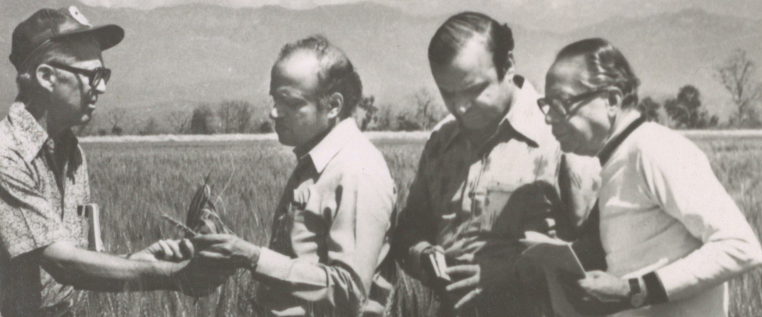Archives at NCBS: Research Fellowship and Scholar-in-Residence Program
The Archives at National Centre for Biological Sciences (NCBS) is delighted to run a Research Fellowship and Scholar-in-Residence Program, toward developing scholarship based on the historical collections at the Archives at NCBS. This Program is generously supported by TNQ Foundation.

MS Swaminathan with Norman Borlaug and others, Indian Agricultural Research Institute (IARI). ca 1966. MS-007-6-2-OS4-7, MS Swaminathan Papers, Archives at NCBS
About the Archives at NCBS:
The Archives at NCBS (https://archives.ncbs.res.in) is a public collecting centre for the history of science in contemporary India. It has over 350,000 processed objects across over 55 collections in various forms, ranging from paper-based manuscripts to negatives to photographs, books, fine art, audio recordings, scientific equipment, letters, and field and lab notes. The 2000-square-feet state-of-the-art physical centre at NCBS includes space for research, processing, exhibitions, recording, and a leading-edge storage facility with monitors for temperature, light, humidity, air quality, water, fire, pests, and noise. Most of the archival catalog is available online (as are many of the digital objects from the collections).
For a full list of collections, access guidelines and vision of the Archives at NCBS, please visit our website: https://archives.ncbs.res.in/.
For queries about the program, email us at archives-scholars@ncbs.res.in.
About the Research Fellowship and Scholar-in-Residence Program:
Research fellows and scholars-in-residence engage with the collections at the Archives at NCBS over a period of 3-6 months.
Research fellows and scholars-in-residence will identify collection(s) that they wish to work on, and outline their area of research or inquiry. They will be expected to be resident in Bangalore and will have access to all campus facilities that is typically provided to research scholars, including library and archival facilities. During their stay, they would be expected to engage with the campus and archives, and also the public through informal talks, and at least one presentation at the end of their residency, culminating in research that is geared toward publication (like a research paper), science-history-art installation, or other modes. They are free to choose the mode of their presentation.
Research Fellowships will be awarded to scholars who can illustrate a keen area of inquiry, a demonstrated interest in the archival collections at the Archives at NCBS, and a plan for how the use of these collections would further understanding of the history and culture of science. Fellows are expected to work closely with the archivists and other researchers at the Archives at NCBS.
Scholars-in-residence are senior scholars who will typically bring with them a substantial body of work that deepens our collective understanding of the history and culture of science. They would also be known for working across disciplinary boundaries, including engagement with the public. They would bring with them a proposal and vision for how the use of these collections along with other archives would further understanding of the history and culture of science.
Research Fellowship and Scholar-in-Residence Program Application Form
https://bit.ly/archives-scholars
- Duration: Three to six months, in residence on the NCBS campus in Bangalore.
- Number: Two to three cycles per year. One to four fellowships per cycle, depending on level of experience and proposal. One to two scholars-in-residence per cycle.
- Eligibility: We invite applications from individuals around the world. There are no restrictions on the applicant’s discipline. Fellows could see their time at NCBS as a way to develop existing projects further, including current graduate research, doctoral or post-doctoral work. Scholars-in-residence could also see this as extending an independent body of research. Applicants do not need to be enrolled in an educational program or employed elsewhere. We look forward to applications from wide-ranging fields such as history, philosophy, sociology, anthropology, law, literature, journalism, archaeology, art, architecture, education, economics, engineering and the sciences.
- Timeline:
- Round 1:
- Application deadline: August 9, 2024
- Selected candidates notified: August 26, 2024
- Start date: Oct 1, 2024 (flexible)
- Round 2:
- Application deadline: Nov 8, 2024
- Selected candidates announced: Nov 29, 2024
- Start date: Jan 1, 2025 (flexible)
- Round 3:
- Application deadline: Jul 31, 2025
- Selected candidates notified: Aug 31, 2025
- Start date: Oct 1, 2025 (flexible)
- Round 4:
- Application deadline: January 1, 2026
- Selected candidates notified: February 1, 2026
- Start date: March 1, 2026 (flexible)
- Round 1:
- Review process: The application form includes provisions for uploading a resume and a statement of intent for the fellowship. A selection committee assembled from within and outside NCBS, will shortlist candidates from the applications we receive. The Committee may then request for references from shortlisted applicants and/or hold interviews with them to make a final selection. All applicants will be notified of the results.
- Research Fellowship: Research Fellows will be paid a consolidated fellowship between Rs 45,000 to Rs 60,000 per month for the duration of their residency, commensurate with education level and experience.
- Fellowship application: Applicants are requested to fill up the online form linked on this website. The form includes provisions for uploading a resume, a statement of intent about the proposed work and use of the collections at the Archives at NCBS.
- Scholars-in-Residence Benefits: Scholars-in-residence will be provided a monthly honorarium of Rs 60,000. NCBS will also provide campus housing for the duration of their residency, and cover related domestic travel expenses.
- Application: Applications can be through nomination, invitation or self-application. Applicants or their nominees are requested to fill up the linked form for the Scholar-in-Residence program. The form includes provisions for uploading a resume, a statement of intent for use of the collections, and plans during the residency on campus.
Research Fellowship and Scholar-in-Residence Program Application Form
https://bit.ly/archives-scholars






